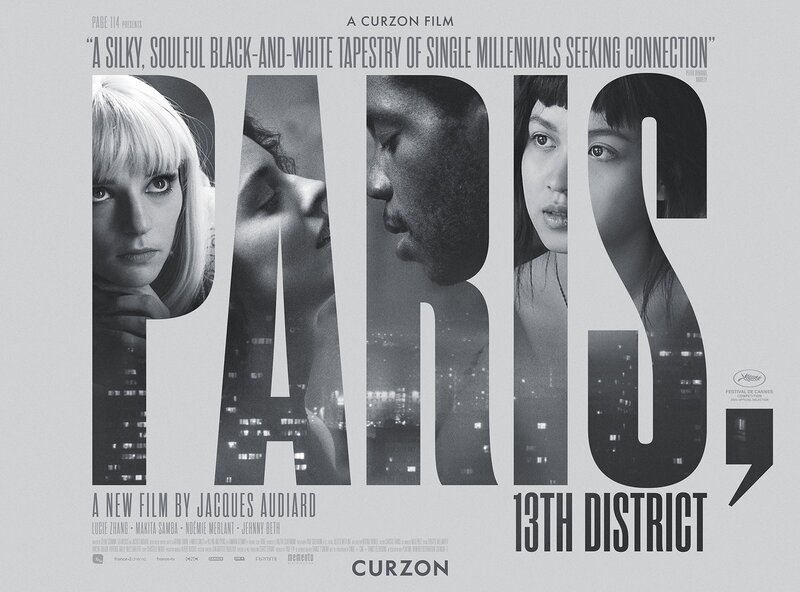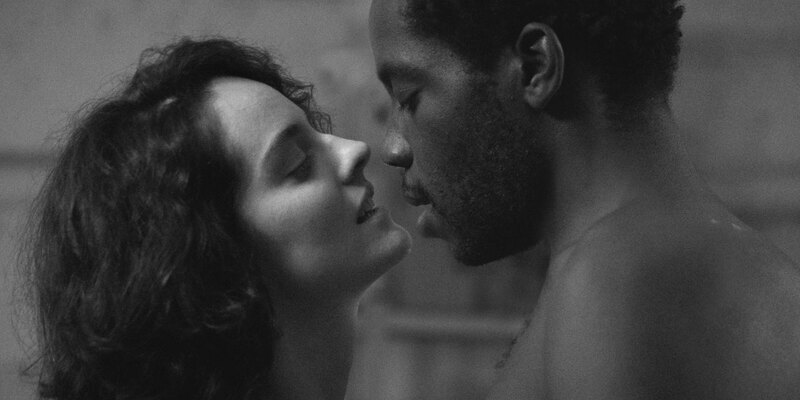
Review by
Eric Hillis
Directed by: Jacques Audiard
Starring: Lucie Zhang, Makita Samba, Jehnny Beth, Noémie Merlant

Paris, 13th District produces, for better and worse,
exactly the set of results you might imagine from a collaboration
between an aging veteran male director and a pair of hip young women
filmmakers. Jacques Audiard - known for his gritty, usually
male-centred films like A Prophet, The Beat That My Heart Skipped and
The Sisters Brothers
– has teamed up with two of France's most revered young female talents
in Céline Sciamma (Portrait of a Lady on Fire) and Léa Mysius (Ava). Together as screenwriters, with Audiard directing, they've adapted
three stories from American graphic novelist Adrian Tomine.

The stories are relocated to the French capital's 13th arrondissement,
a trendy area largely populated by immigrants from France's East Asian
colonies. It's there we find the film's quartet of central players, all
unsure whether they're actively looking for love or trying to avoid such
hassle. Emilie (Lucie Zhang) lives in the apartment vacated by
her Chinese grandmother, now confined to a rest home, while working at a
call centre job her sarcastic temperament is ill-suited to. When she
advertises for a tenant to rent the flat's spare room, the listing is
answered by handsome teacher Camille (Makita Samba). Before a
lease is agreed, the landlady and prospective renter are getting hot and
sweaty, which continues when Camille moves in. The pair agree that's
it's a no-strings arrangement, but Emilie secretly wants more from their
relationship, which drives a wedge between the flatmates.
Elsewhere in the district, thirtysomething mature student Nora moves
into a new apartment. When she's mistaken for cam-girl Amber Sweet
(singer Jehnny Beth), she finds herself the subject of scandal at
her law school, with fellow students sharing explicit videos of the
woman they wrongly believe to be their classmate. Intrigued by how she
might have been confused for this woman, Nora tracks down Amber online
and finds herself drawn towards her charms.

For an English language equivalent of the contradictory tone struck by
the Audiard-Sciamma-Mysius axis here, imagine Woody Allen working
alongside Phoebe Waller-Bridge. The millennial protagonists come off as
largely convincing, but there are instances where the film seems
completely out of touch with the attitudes of today's younger
generations. The sub-plot of Nora's disgrace at school is particularly
difficult to swallow. Would a school full of Gen-Zers react with such
mockery at learning a fellow student was an online sex-worker? Maybe I'm
wrong, but it seems the sort of thing that would only improve Nora's
street cred among her young classmates. This is 2021 Paris after all,
not 1956 Alabama.
If details like that seem to miss the mark, such cracks are papered
over to a considerable degree by the strength of the performances here.
Merlant continues her rise in Gallic cinema with another of her
trademark turns as a woman trying to keep her emotions in check.
Newcomer Zhang is the real trump card here, delivering a comic
performance par excellence. She deftly portrays Emilie as a mix of
streetwise front and schoolgirl vulnerability, and she has everything
you could want in the heroine of an off-kilter rom-com. The film never
quite matches her strengths, but I suspect this is a young star we'll be
seeing a lot more of in the coming years.

If Audiard occasionally fluffs his lines in a genre he seems ill-suited
to here, visually he certainly keeps things interesting. With its bland
and brutal architecture, the titular setting is an unconventional one
for a romantic comedy, but Audiard and cinematographer
Paul Guilhaume manage to find a beauty in the straight lines and
sharp edges of the sort of tower blocks usually coded as dangerous in
French cinema. Shot in monochrome, it's a black and white movie whose
protagonists find romance refuses to conform to such binary
simplicity.

